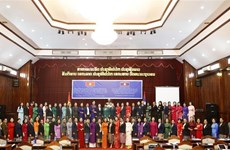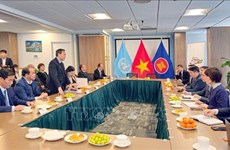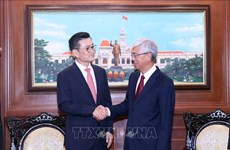VN contributes largely to Mekong-Japan Summit
Vietnam has made active contributions to the preparations of the 4th
Mekong-Japan Summit, particularly the formulation of Tokyo Strategy.
Vietnam has made active contributions to the preparations of the 4th
Mekong-Japan Summit, particularly the formulation of Tokyo Strategy.
Deputy Foreign Minister Bui Thanh Son made the comments in an interview granted to the press in Hanoi on late April 21 upon his return from the 4th Mekong-Japan Summit in Tokyo from April 20-21.
He said at the summit, Prime Minister Nguyen Tan Dung reaffirmed Vietnam’s support for Mekong-Japan Cooperation and its role in the prosperity, stability and development of the Mekong region and East Asia in general.
PM Dung pointed out priorities needed to be focused in the coming time, including the upgrade of trans-national transport corridors like EWEC and SEC and the implementation of the cross-border transport agreement (CBTA). He also proposed the creation of a multi-form transport system to facilitate the connectivity between economic corridors in the Sub-Mekong region.
According to Deputy FM Son, PM Dung underlined that cooperation in the management and use of Mekong River water resources should be focusing on assisting countries lying along the river in dealing with floods, natural disasters and seawater intrusion, ensuring food security and seeking long-term solutions to the sustainable use of Mekong River water resources.
He referred to giving priority to conduct a research on environmental impacts of the exploitation and use of Mekong River water resources, including impacts of hydroelectric power facilities on the river, in a scientific, comprehensive and systematic manner, which received high approval at the summit.
Regarding economic and trade cooperation, PM Dung emphasised the role of the private sector in implementing Mekong-Japan cooperation programmes and called for attentions to further develop the supporting industry in the region.
On the outcomes of the 4th Mekong-Japan Summit, Deputy FM Son mentioned the adoption of the Tokyo Strategy, with which the leaders defined three new cooperation pillars.
These include the enhancement of connectivity within the Mekong region and with the outsiders, the promotion of trade and investment between Mekong countries and Japan to raise their position in the global value chain, and cooperation on environmental issues and public security.
At the conference, Japan pledged an ODA provision of 600 billion JPY to the Mekong countries for the period 2013-2015 while Thailand pledged 883 million JPY.
On the East Sea issue, the Mekong countries and Japan agreed that all concerned parties should settle the East Sea dispute by peaceful means in the spirit of mutual understanding and mutual respect.
These parties must fully obey international laws, especially the 1982 UN Convention on the Law of the Sea and the Declaration on the Conduct of Parties in the East Sea, and speed up the building of a Code of Conduct for the East Sea (COC), they said./.
Deputy Foreign Minister Bui Thanh Son made the comments in an interview granted to the press in Hanoi on late April 21 upon his return from the 4th Mekong-Japan Summit in Tokyo from April 20-21.
He said at the summit, Prime Minister Nguyen Tan Dung reaffirmed Vietnam’s support for Mekong-Japan Cooperation and its role in the prosperity, stability and development of the Mekong region and East Asia in general.
PM Dung pointed out priorities needed to be focused in the coming time, including the upgrade of trans-national transport corridors like EWEC and SEC and the implementation of the cross-border transport agreement (CBTA). He also proposed the creation of a multi-form transport system to facilitate the connectivity between economic corridors in the Sub-Mekong region.
According to Deputy FM Son, PM Dung underlined that cooperation in the management and use of Mekong River water resources should be focusing on assisting countries lying along the river in dealing with floods, natural disasters and seawater intrusion, ensuring food security and seeking long-term solutions to the sustainable use of Mekong River water resources.
He referred to giving priority to conduct a research on environmental impacts of the exploitation and use of Mekong River water resources, including impacts of hydroelectric power facilities on the river, in a scientific, comprehensive and systematic manner, which received high approval at the summit.
Regarding economic and trade cooperation, PM Dung emphasised the role of the private sector in implementing Mekong-Japan cooperation programmes and called for attentions to further develop the supporting industry in the region.
On the outcomes of the 4th Mekong-Japan Summit, Deputy FM Son mentioned the adoption of the Tokyo Strategy, with which the leaders defined three new cooperation pillars.
These include the enhancement of connectivity within the Mekong region and with the outsiders, the promotion of trade and investment between Mekong countries and Japan to raise their position in the global value chain, and cooperation on environmental issues and public security.
At the conference, Japan pledged an ODA provision of 600 billion JPY to the Mekong countries for the period 2013-2015 while Thailand pledged 883 million JPY.
On the East Sea issue, the Mekong countries and Japan agreed that all concerned parties should settle the East Sea dispute by peaceful means in the spirit of mutual understanding and mutual respect.
These parties must fully obey international laws, especially the 1982 UN Convention on the Law of the Sea and the Declaration on the Conduct of Parties in the East Sea, and speed up the building of a Code of Conduct for the East Sea (COC), they said./.











